Table of Contents
Everyone has probably thought about how great it would be to have a toned and flat stomach just like all the fitness people on social media at some point of their life. A nicely toned six-pack not only looks great, it shows your surroundings that you work hard on yourself. Even though the models doing sit-ups in front of a camera give it a bright and broad smile, you probably already know it’s not quite the cakewalk they make it seem to be. Behind a six-pack are literal hundreds of hours spent in the gym, well-managed dietary habits, optimum recovery and a whole lot of other factors.
In today’s article, we’ll focus on a few key points, which will help you lose the layer of subcutaneous fat around your waist and reveal your long dreamt of six-pack.
What actually is a six-pack?
Let’s start with some good news. There’s no need to wait for the six-pack to somehow crop up out of the blue. You already have them. We all do. The problem is that there’s a layer of subcutaneous fat that successfully covers them up. This might make you feel like instead of a six-pack, your body only has some sort of single-pack going on. But don’t worry – the muscles themselves are certainly there. To make them visible, you will simply need to increase their volume and decrease the amount of fat around them. Genetics play a certain role here. In addition, the required body fat percentage that will allow your abs to actually pop through differs slightly between men and women. Another factor depends on where your body tends to start burning its fat reserves first. You can’t simply decide to take it off from around your waist right away. It simply doesn’t work that way.
You may also be surprised by the fact that not everyone has the genetic predisposition to form a six-pack. The anatomic structuring of your muscles plays a serious role here too. Don’t be disappointed if you tone your stomach only to show a four pack or, conversely, taken aback if you end up showing an eight pack. This is completely natural and each new brick popping through your skin should be a point of great pride for you. [1]
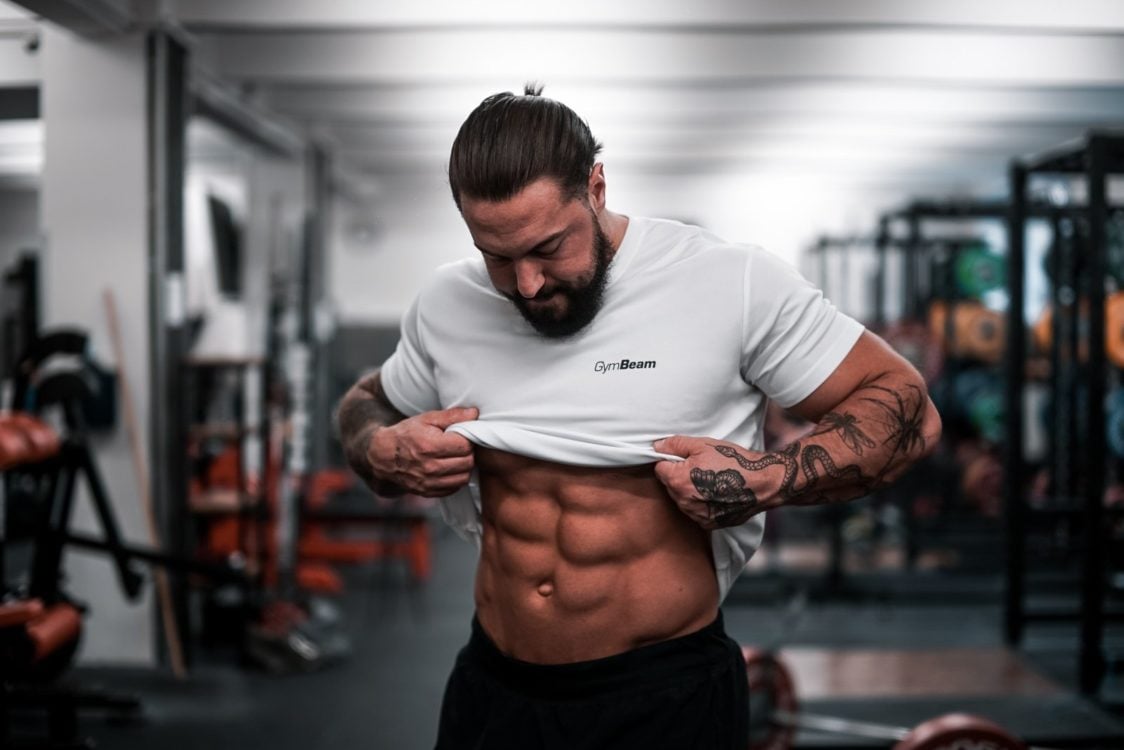
How to gain a toned six-pack?
Thinking about how to lose weight directly from your stomach? If you think that the first thing we’ll recommend you to do is 1000 sit-ups a day for guaranteed success, we’ll have to disappoint you. The journey to a toned stomach is much more complex than that. You also shouldn’t be surprised that there’s no magical metabolism-boosting drink, spring time detox or celery-juice-for-breakfast scheme that would do all the work for you.
Getting that dream six-pack of yours is more of an endurance run. This is why many of us fail and turn around in disappointment after completing the “30 day programs for perfect, flat stomach” without any visible success. To actually reach your goal, you will need a 100% determination. You’ll have to be sure this is something you want, and you have to be willing to make some sacrifices for it. It’s the only way.
1. Calculate the amount of calories you should be consuming
When it comes to visible changes in the figure, it’s generally easier for people who are overweight to achieve them. First changes can appear after nothing more than a few small changes to the overall eating habits. However, this becomes increasingly more difficult to achieve when it comes to the last few kilos of fat hanging around your abdomen. At this stage, achieving visible changes takes significantly more effort. Our energy intake calculator can be a great starting point for you, helping you calculate the necessary amount of energy according to your lifestyle and goals. Once you have your values calculated, you will need to start weighing your meals and jotting down the values of your macronutrients and calories. This can be facilitated greatly by using a variety of apps available.
Try sticking to the recommended values for about two to three weeks, and then measure your progress by checking your weight, difference in circumferences of your body parts, and comparing photos of yourself within these intervals. If you haven’t noticed any progress at all, try decreasing your daily calorie intake by a further 200 calories, and measure again in two to three weeks.
Once you get into it, following your daily intake will become your second nature. In the end, you will be able to benefit from all the advantages that counting your calories entails. To learn more details about that, check out our article How to Eat Pizza, Sweets, and Still Lose Weight Thanks to IIFYM?

2. Pick more suitable food and drinks
2.1. Focus on your protein intake
Calories aren’t everything. If you use our energy intake calculator, you may notice that it also recommends you values of macronutrients that you should roughly stick to. In the end, the ratio between fats and carbohydrates isn’t all that crucial. When trying to lose fat and grow muscle, the important thing is to ensure you have sufficient intake of high quality protein. This can be achieved with any choice of meat, high quality dairy products, or legumes. The variety of protein sources available is something we will discuss in a separate article. Naturally, a good whey protein supplement, can help you do this very easily, whether in the form of a shake or as an ingredient in other dishes. And to make sure it’s truly accessible to everyone, we did not forget about plant-based sources of protein for vegetarians and vegans.
2.2. Don’t forget about fruits and veggies
According to the general recommendations, you should eat about 600 g of fruits and vegetables a day, roughly in a 1:2 ratio. This helps cover your daily requirement of micronutrients such as vitamins and minerals. Additionally, these foods have other advantages too. They contain relatively small amount of calories per large volume. This is because they are largely made up of water and are also rich in dietary fibre and other beneficial substances, such as antioxidants. Thanks to this, fruits and veggies can help you fill your stomach with more satiety, which is particularly welcome when you’re trying to say in a calorie deficit. [2]
If you’re looking for more tips on how to improve your eating habits, don’t miss out on our article What Is a Healthy Diet and How to Eat Healthy?
2.3. Cut down on fast-food
Eating fast food has several problems with it:
- Generally, fast-food tends to be made entirely out of ultra-processed foods, the nutrition value of which is quite poor (low nutrition density).
- Fast food also contains a lot of calories in small volumes, which makes it very easy to go over your pre-set calorie intake limits.
- 400 calories of fast food will likely satiate you a lot less than a 400 calories worth of a complex meal with balanced macronutrient profile. [23]
- Fast food also contains a lot of salt, which is unfortunately present in unhealthy quantities in the diet of the general population. [3–6]
However, this doesn’t mean you have to avoid eating fast food altogether. Be smart about your choices. For example, pick a grilled chicken tortilla wrap with a side of salad without dressing or mayo accompanied with a simple glass of water. This actually makes for quite a healthy lunch.
2.4. Avoid liquid calories in soft drinks and sweetened juices
Food has calories in it, and we’ve come to expect that. However, you may be unpleasantly surprised with the amounts of calories present in soft drinks. [7]
Average calories per 500 ml
Beverage | Calories |
|---|---|
| Coca-cola | 226 kcal |
| Sprite | 171 kcal |
| Orange juice | 222 kcal |
| Energy drink | 263 kcal |
| Nestea Peach | 94 kcal |
| Fanta | 140 kcal |
2.5 Cut down on alcohol
The same goes for alcohol. What’s worse, drinking tends to do away with your inhibitions and leave you much more susceptible to succumb to cravings for a kebab or a pizza while waiting for your night-time bus home. And that’s not to mention snacking on crisps and salted peanuts while drinking. The increased intake of carbohydrates and salt from a variety of treats can also manifest in higher water retention rate in your body, which may also prevent your abdominal muscles from peeking through. [7–10]
Average calories found in alcoholic beverages
Beverage | Calories |
|---|---|
| 4% alc. beer (500 ml) | 185 kcal |
| 4.6% alc. beer (500 ml) | 265 kcal |
| Semi-dry white wine (200 ml) | 146 kcal |
| Dry prosecco (200 ml) | 132 kcal |
| A shot of vodka (0.4 dl) | 70 kcal |
| Cuba libre (200 ml) | 160 kcal |
Once you realize that a single night out can add several hundred calories to your daily count, it becomes clear that regular partying isn’t something you’ll be able to afford if you are serious about getting that six-pack. But as mentioned in the introduction – it all comes at a certain price. In this case, opting for a glass of water will certainly be your best bet.
If you want to learn more about liquid calories and where else they’re hiding, don’t miss out on our article Where Are Liquid Calories Hiding and How Do These Empty Calories Prevent You from Losing Weight?
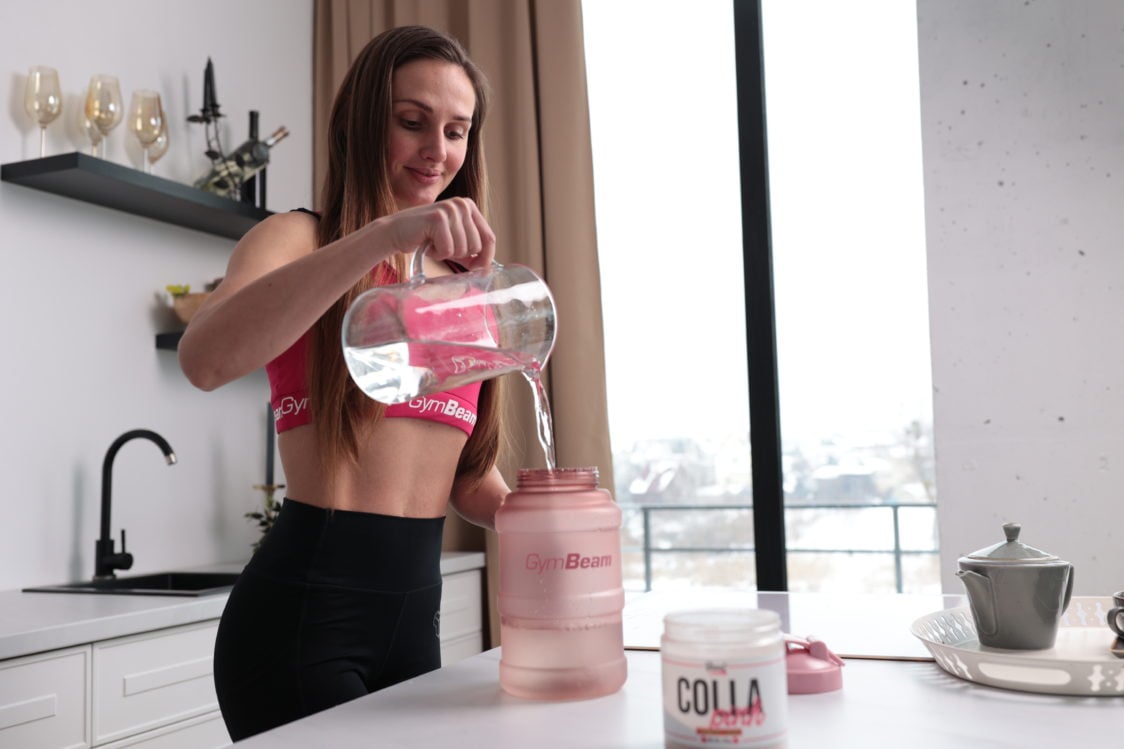
You might be interested in these products:
3. Pick up some muscle mass
As we’ve discussed in the beginning, everyone already has a six-pack from the get go, and your only real goal is to reduce your body fat percentage, so that it can start peeking through the skin. However, focusing on the abdomen is only a part of the story. To make sure your body looks good, you’ll need to build muscle mass all around. To achieve that, you will need a solid training plan, that takes your time restrictions into consideration. [11]
For some, this means doing strength training three times a week. Some may even do four, depending on their timetable affordances. In any event, avoid the beginners mistake of googling “best exercises for abs” and jumping right into the endless repetition of these exercise day in and day out without any consideration. This is clearly not the way. Instead, focus on the full-body workout.
If you start going to the gym three times a week, your best choice will be doing full-body training based on complex exercises such as squats, lunges, deadlifts, push-ups, etc. All of these engage various muscle groups at once, making your training highly effective. Adding abdominal area training twice a week on top of all that will be more than enough to get you started.
Find inspiration for ab workout in our other articles:
- Looking for effective exercises for working on your abdomen? Find them in our article 21 Best Bodyweight Ab Exercises.
- You can also target abs with a fit ball. To learn how to do that, check out 10 Effective Core & Booty Exercises with a Fit Ball.
- Get inspired for a quick and intense core workout with our article Effective 6-Minute Abs Workout at Home.
- Great circular workouts focused on the core can be done following our article Strengthen Your Core With This Ab Circuit Workout.
- Lower abdominal area can be focused on with the tips in our article Lower Abs: 13 Best Bodyweight Exercises.
Finally, you can enlist the help of exercise tools perfect for home workouts and the gym.
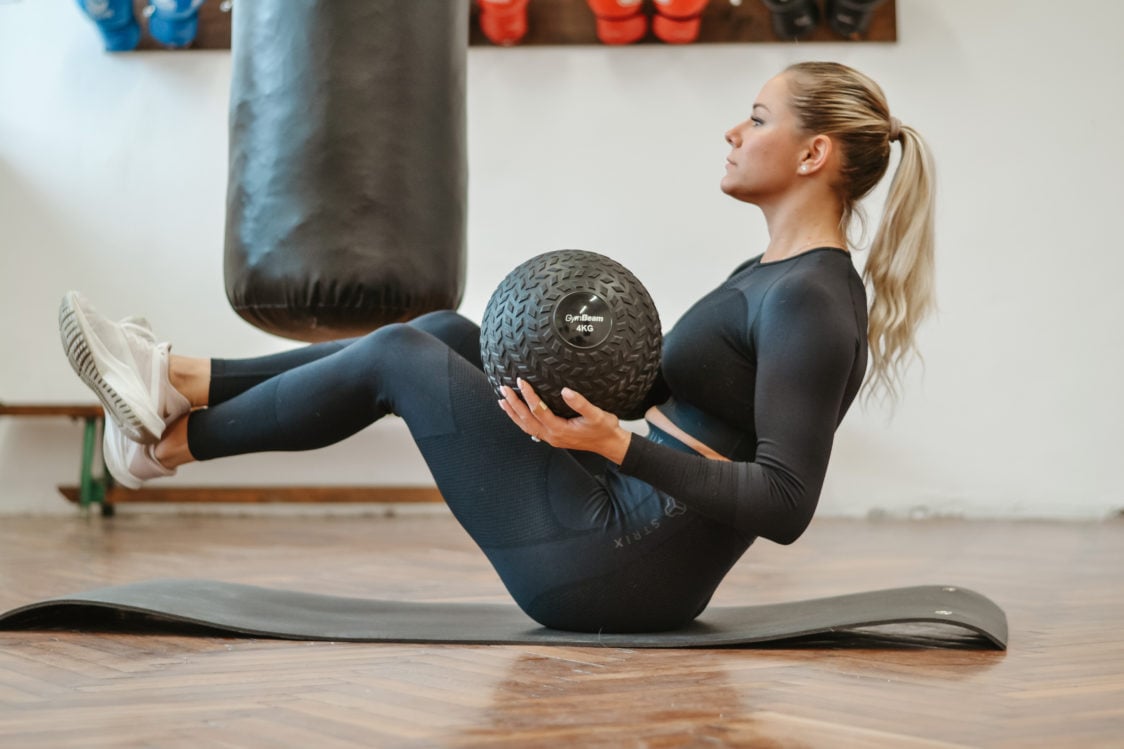
4. Don’t neglect cardio
For some time, many strength athletes were misled by a common misconception that doing cardio breaks down the painstakingly accumulated muscle mass. As usual, what throws light upon the problem is the proper context. If you run a half-marathon three times a week, your recovery won’t be able to happen at an optimum rate. In turn your body is likely to drop some muscle mass so as to adapt and lose weight in order to make you lighter. However, this is definitely not a scenario you have to be worried about if you go for an hour-long jog once in a while. The same goes for an occasional bike trip or a weekend mountain hike.
As a matter of fact, these activities are not only useful for maintaining a healthy cardiovascular system, they are also great for supporting weight loss. They are commonly known to burn a good number of calories, thanks to which you will progressively decrease your body fat percentage and slowly uncover your abdominal muscles. If you want to achieve visible results in the shortest time possible, it is best to combine a balanced diet with strength training and cardio. [12]
In addition, to boost your efforts and maximize the amount of calories you burn during your workouts, you may try using an effective fat burner.
- Do you want to know which activity is the fastest to burn a kilogram of fat? Don’t miss out on our article How to Lose a Kilogram of Fat, and How Many Calories Are Actually Hidden in It?
- Finally, if you simply don’t have the time for an extensive cardio training, you can always burn more calories with HIIT and a skipping rope. Learn more about interval training in the article How to Skip Rope? 6 Exercises and 3 HIIT Workouts for Intense Calorie Burning.
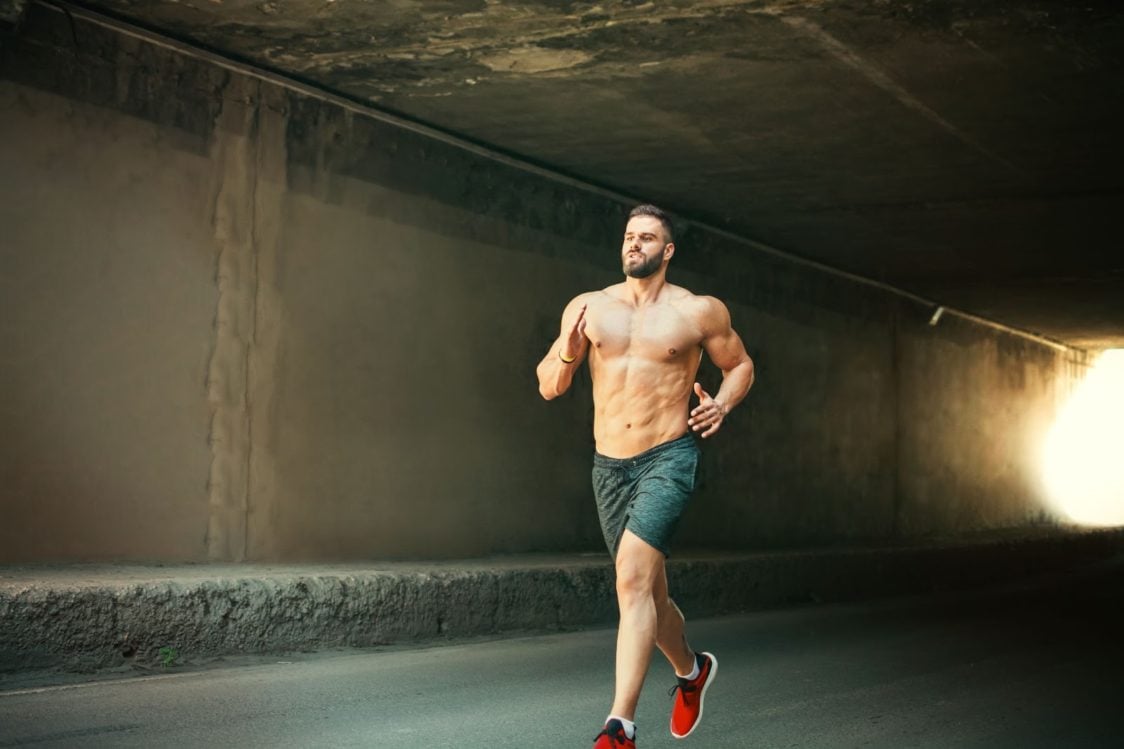
5. Be more active throughout the day
Sticking to your training plan is the main thing. However, if all of your exercise shrinks down to three hours a week spent in the gym, while the rest of your week includes not much more than sitting behind a computer, you’ll find it won’t be quite enough. Don’t underestimate the importance of natural exercise you get throughout your regular daily routine (aka NEAT). Read more about it in our article What Is the Most Important Factor in Weight Loss?
Let’s illustrate by an example of a 65 kg woman:
- She walks to and from her office every day, which adds up to about one and a half hour of walking and translates to about 488 burned calories. She spends 2 hours doing household chores in the afternoon, burning another 428 calories. Simply by doing this, she’s already burning 916 calories. And that’s not a negligible number.
- For comparison, if the same woman spends her afternoons watching TV and commutes to work using public transportation to save some extra bedtime, she only burns about 250 calories in the same span of time.
- As you can see, these simple activities not related to sports in any way can already make the significant difference of 666 calories a day.
If your calorie output increases by having more physically active daily habits, not only will you fortify your overall health, you will be able to eat more even during weight loss. And you can be sure that losing weight on a full stomach is a lot more pleasant than suffering through hunger pangs. [13–14]
How to incorporate more natural exercise in your daily routine?
- Walk more. Get off the bus one stop earlier and take a walk to your destination.
- Say goodbye to lifts and escalators. Make friends with good old fashioned stairways.
- Do house chores.
- Do some gardening.
- Don’t spend time lying throughout the day.
- Take your dog for a walk.
- Help your friends and family with some babysitting. Children are restless and will surely keep you off the chair.
There’s more than enough ways to keep yourself physically active. The most important thing is to find something you will enjoy doing. That’s the best way to make sure you’ll be sticking with it.

6. Avoid extreme approaches
If you think that the less you eat, the faster you’ll see the results, you are mistaken. Sometimes you’re just too overwhelmed and busy to eat enough throughout your day, and end up taking in a really low amount of calories. That may seem like a good thing in terms of weight loss, but if it becomes a regular occurrence in your lifestyle, you are setting yourself up for some serious health issues further down the road. This sort of strategy is often at the bottom of monthly challenges and quick weight loss programs, which promise immediate results.
Possible effects of insufficient calorie intake over long periods of time:
- tiredness
- having an irregular period, or completely skipping it
- decrease in bone density
- nausea and headaches
- extreme weight loss
- digestive issues
- hair loss
- feeling cold
- more prominent tooth decay
- weakened natural defences [15–18]
These are only some of the physical consequences connected to excessively low calorie intake. What’s more, it can negatively influence your mental health too, and even result in eating disorders.
Consequently, always keep in mind that health should be your number one priority. Don’t try to eat as little as possible hoping for quick results. Your body needs energy to function and run all of its processes properly. Make sure that it has what it needs even if it may slow down the appearance of your desired results. It’s likely a no-brainer, but it needs to be said that waiting for your six-pack for a longer time is certainly worth saving yourself the potential health issues.

7. Don’t forget about regeneration
You may be surprised to learn that regeneration is just as important as the training itself. But once you think about it, it makes perfect sense. The muscles don’t grow while you’re pumping them in the gym. They grow in volume while your body regenerates and rebuilds muscle tissue that was damaged while working out. If you don’t give it enough time to do so and rush right into the next training, you’ll end up slowing your results. Training hard while your body still repairs from the last intense workout may actually hold you back.
This means working your abs for an hour every morning and every evening is not productive. It’s much better to simply include a core workout routine into your regular training plan twice a week. Don’t worry – it’s just enough. The fact is that your abdominal muscles actually get to work even when doing other complex exercises focused on different body parts, without you even knowing about it. [19]
If you’re thinking what further steps you can take to improve your recovery, try devices such as a massage gun, foam roller, or other accessories that you can read up about in our article How to Support Regeneration Using a Massage Gun and Other Tools?
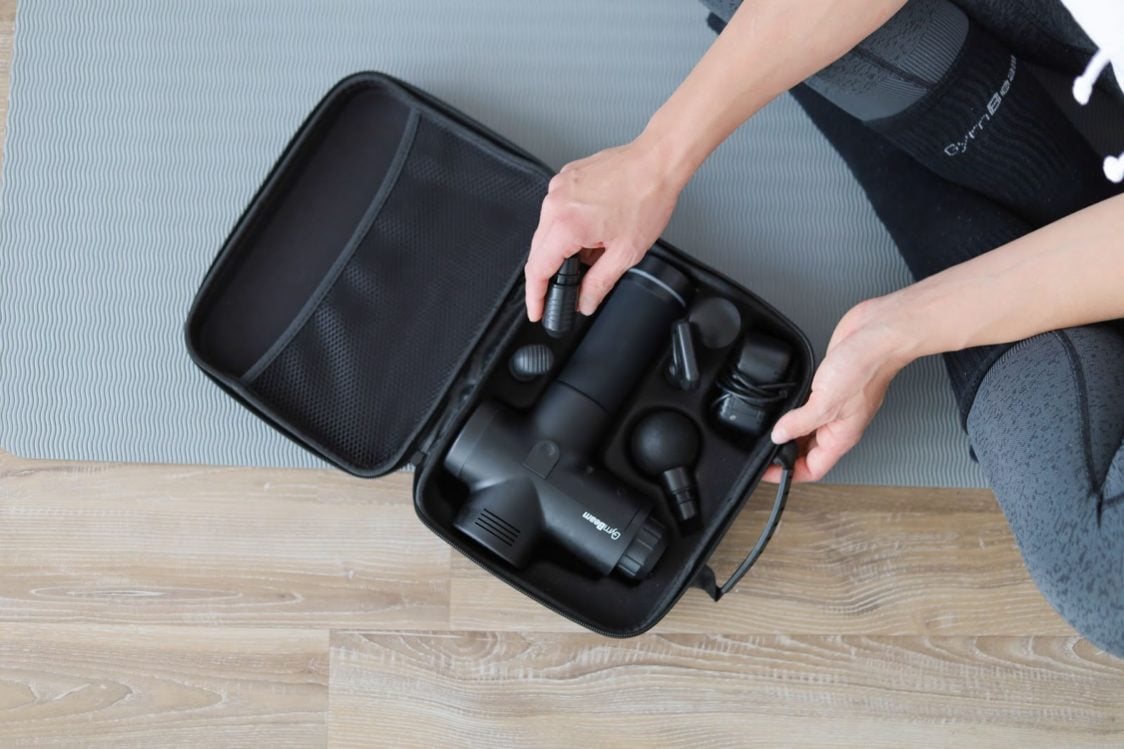
8. Don’t underestimate sleep
What does sleep have to do with ripped waistline physique? Turns out quite a lot. Sleep impacts the levels of hunger and satiety hormones known as leptin and ghrelin in your body. When you sleep well, the levels of these hormones are much more balanced, and you have more control over how much food you put on your plate. When you pull an all-nighter or sleep too little, this balance is upset and usually tipped in favour of ghrelin (hunger hormone), decreasing the levels of leptin (the hunger of satiety). This in effect manifests in a heightened sense of hunger and craving for more calorie dense foods, which is not good when trying to lose weight and tone your abs. [20–21]
And that’s not the only way sleep impacts your weight loss efforts. Not giving your body enough rest at night will leave it feeling fatigued during the day. Naturally, this will leave you feeling like you want to rest and move a lot less. As we know, movement burns calories. In effect, the lack of sleep leads to fewer calories burned throughout the day, and slower decrease in body fat, not only around the waist. [22]
Finally, it goes without saying that while you’re asleep, you’re not raiding the fridge at night. Simply put, sleep is a great helper on your journey to a toned six-pack, and you should therefore give it enough time, ideally about 7 to 8 hours a day. Not only will you have more energy for working out, you will function better and have better overall mood.
- If you want to learn more about the benefits of sleep, don’t miss out on our article Sleep: The Most Effective Energy Booster and Fat Burner.
- Find tips on how to sleep better in our article How to Fall Asleep Quickly? Try These Simple Tips for Better Sleep.
- You can also improve your sleep quality with our products for better sleep.

9. Be patient and consistent
If you’ve embarked on the journey towards your six-pack thinking it would only take one month of strict discipline before you start seeing the results, you will likely be disappointed. Losing belly fat and revealing the muscles around these parts is a lot more demanding on your time and effort. You’ll have to make some sacrifices, force yourself to work out even when you don’t feel like it, and perhaps even say no to a visit to a brewery with unlimited beer consumption policy. However, if you manage to overcome all of the hurdles and see the results, you’ll have a real solid reason to be proud of yourself. After all, if getting a six-pack was easy, everyone would have it, right?
Find more tips about how to stay disciplined and motivated in our article How to Set a Goal and Actually Achieve It.
If you want to learn more about how to lose belly fat and reveal a six-pack, you’ll find further help in our articles:
- Lose Belly Fat and Get Into Shape with Our Simple Guide.
- A Proven Guide to a Six-Pack: Diet and Training Routine for Sculpted Abs.
What’s the take home message?
Your journey towards a six-pack starts with motivation. You will have to be determined that it’s something you absolutely want. This desire will drive you forward even on days when you really don’t feel like working on it. Following the tips in these articles will certainly help you achieve it in the end. And once you see the results, the satisfaction will certainly be worth it.
Know someone in your surroundings who dreams of having a six-pack but doesn’t know where to start? Share this article with them, and point them in the right direction.
[1] Fakulta sportovních studií Masarykovy univerzity. Základy anatomie pohybového ústrojí – https://is.muni.cz/do/fsps/e-learning/zaklady_anatomie/zakl_anatomie_I/pages/svaly_bricha.html
[2] Joanne L. Slavin, Beate Lloyd, Health Benefits of Fruits and Vegetables – https://www.ncbi.nlm.nih.gov/pmc/articles/PMC3649719/
[3] Cem Ekmekcioglu, Gerhard Blasche, Thomas E Dorner, Too much salt and how we can get rid of it – https://pubmed.ncbi.nlm.nih.gov/24434760/
[4] The trouble with excess salt – https://www.health.harvard.edu/staying-healthy/the-trouble-with-excess-salt
[5] Salt: the facts – https://www.nhs.uk/live-well/eat-well/food-types/salt-nutrition/
[6] Salt reduction – https://www.who.int/news-room/fact-sheets/detail/salt-reduction
[7] My Fitness Pal – https://www.myfitnesspal.com/
[8] What causes a puffy face in the morning? – https://www.medicalnewstoday.com/articles/puffy-face-in-the-morning
[9] Why Alcohol Can Cause Swelling and Puffiness — and What to Do About It – https://www.livestrong.com/article/526475-can-drinking-alcohol-cause-your-body-to-become-swollen/
[10] Edema – https://my.clevelandclinic.org/health/diseases/12564-edema
[11] Sachin S Vispute et al. – The effect of abdominal exercise on abdominal fat – https://pubmed.ncbi.nlm.nih.gov/21804427/
[12] Leslie H. Willis et al. – Effects of aerobic and/or resistance training on body mass and fat mass in overweight or obese adults – https://www.ncbi.nlm.nih.gov/pmc/articles/PMC3544497/
[13] Jiangqi Tang et al. – A Device to Increase Non-Exercise Activity Thermogenesis in Adults – – https://paahjournal.com/articles/10.5334/paah.53/
[14] Compendium of physical activities – https://sites.google.com/site/compendiumofphysicalactivities/Activity-Categories/winter-activtities
[15] Cockburn, Claremont, Fremantle. Relative Energy Deficiency in Sport RED-S. – – https://www.perthsportsmedicine.com.au/relative-energy-deficiency-in-sport-perth-claremont-cockburn-wa.html
[16] Redman, L. M., & Loucks, A. B. Menstrual disorders in athletes – https://doi.org/10.2165/00007256-200535090-00002
[17] National Collegiate Athletic Association. ENERGY AVAILABILITY – https://www.sportsrd.org/wp-content/uploads/2018/11/Energy_Availability_Fact_Sheet_WEB.pdf
[18] CPE Monthly: The Female Athlete Triad, Relative Energy Deficiency in Sport—Today’s Dietitian Magazine. (b.r.). – https://www.todaysdietitian.com/newarchives/0217p46.shtml
[19] Bernaciková, M., Masarykova univerzita, & Fakulta sportovních studií. – Regenerace a výživa ve sportu (1. vyd.)
[20] Can Overeating Cause Sleep Disturbances? Sleep Foundation. – https://www.sleepfoundation.org/physical-health/sleep-and-overeating
[21] Taheri, S., Lin, L., Austin, D., Young, T., & Mignot, E. Short Sleep Duration Is Associated with Reduced Leptin, Elevated Ghrelin, and Increased Body Mass Index – https://doi.org/10.1371/journal.pmed.0010062
[22] HelpGuide.org. Sleep Deprivation: Symptoms, Causes, and Effects – https://www.helpguide.org/articles/sleep/sleep-deprivation.htm
[23] Kevin D Hall et al. – Ultra-Processed Diets Cause Excess Calorie Intake and Weight Gain: An Inpatient Randomized Controlled Trial of Ad Libitum Food Intake – https://pubmed.ncbi.nlm.nih.gov/31105044/

